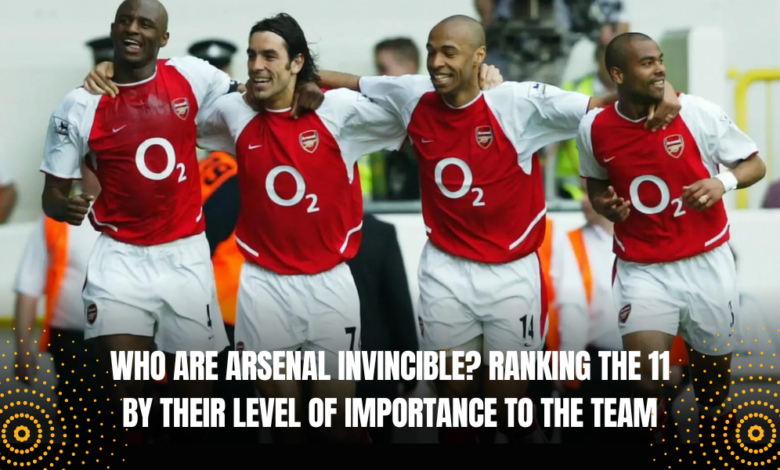
The 2003-2004 Arsenal team, known as the “Invincibles,” achieved an unbelievable feat by remaining undefeated throughout an entire Premier League season. This remarkable accomplishment was a result to the collective effort, exceptional talent, and tactical brilliance of each player.
In this article, we delve deep into the contributions of the 11 Arsenal Invincibles, ranking them based on their level of importance to the team’s triumphant campaign.
The Arsenal Invincibles: A Statistical Odyssey of Unrivaled Premier League Supremacy
In the storied tapestry of the Premier League, one indomitable team emerges as an enigma of statistical supremacy – the 2003-04 Arsenal ensemble. Their epochal feat of invincibility, an impregnable march through the league, is a numerical marvel that stands unparalleled to this day, casting them as the zenith of footballing achievement.
Under the meticulous stewardship of Arsène Wenger, who commenced his managerial tenure at Arsenal in 1996, a tactical revolution was borne. A data-driven playbook of possession-based artistry, characterized by intricate passing sequences, found its ideal conduits in the likes of Thierry Henry, Dennis Bergkamp, and Robert Pirès – savants who transformed statistical data into poetry in motion.
The bedrock of this triumph, however, lay not solely in the realm of attack. A defensive matrix, led by the imperious Patrick Vieira and the unyielding Sol Campbell, fashioned an impervious bulwark. The goalkeeping sentinel, Jens Lehmann, embellished his record with meticulous shot-stopping prowess.
Their mettle found expression in a numerical odyssey – an unprecedented 49-game streak untouched by defeat, unfurling from October 2002 to October 2004. This statistical monument culminated in a Premier League coronation with an astounding 90 points, an unprecedented zenith that rendered all prior records obsolete. Aflame with statistical prowess, they navigated their way to the FA Cup final, a singular blot being their valiant duel with Manchester United.
The Invincibles were not a mere constellation of individual talents; they coalesced into a statistical symphony of collective brilliance. Their matchday orchestration, a fusion of data-driven precision and artistic exuberance, manifested as a statistical eulogy to Premier League supremacy – a testament to the infinite potential of numerical alchemy.
As the eons unfold, the saga of the Arsenal Invincibles is recounted in an eternal loop of statistical resonance. Their triumphs transcend anecdote; they emerge as a tableau of statistical marvel, an empirical testament to the harmonization of talent, strategy, and inexorable resolution. The numbers stand, an indelible mark of statistical grandeur, in perpetual admiration of an era when data and destiny converged in symphonic harmony.
Ranking the Arsenal Invincibles
11. Freddie Ljenburg
Ljungberg’s energy, work rate, and versatility made him a vital component of Arsenal’s midfield. His ability to cover ground, press opponents, and transition quickly between defence and attack added intensity to the team’s playing style. The right-midfielder started 27 out of 38 games for Arsenal and also scored four goals in the process.
Ljungberg’s style of play perfectly complemented Arsenal’s attacking philosophy. He had the ability to make intelligent runs behind the opposition’s defence, exploiting spaces created by the movement of players like Henry and Bergkamp. Ljungberg’s attitude and resilience were evident throughout the season which became a key for the team’s success.
10. Lauren
As the team’s right-back, Lauren played a pivotal role both defensively and offensively, contributing to the team’s success on multiple fronts. His ability to read the game, make timely interceptions, and engage in well-timed tackles disrupted countless opposition attacks. Lauren’s versatility and tactical awareness were crucial assets for the team. He was not only adept at defending but also had the ability to overlap and contribute in attack.
His accurate crosses and ability to join the attack added another dimension to Arsenal’s offensive options. As an experienced player, Lauren’s professionalism and leadership qualities were evident on and off the pitch and this helped Arsene Wenger too to manage the team during the game.
9. Kolo Toure
Kolo Touré’s agility, pace, and versatility made him an exceptional center-back. His ability to recover quickly and cover ground was vital for maintaining a high defensive line, a key component of Arsenal’s playing style. He was also physically disciplined as he played 37 matches out of a possible 38.
Touré’s comfort on the ball and composure in possession were crucial for building attacks from the back. His ability to initiate play from defence, often through his accurate passing, contributed to Arsenal’s possession-based style of play. Touré’s versatility at the age of 22 allowed him to play as a center-back or even as a right-back if needed which was very unique for Wenger.
8. Ashley Cole
Ashley Cole’s defensive excellence was a cornerstone of Arsenal’s success. His ability to read the game, make crucial tackles, and track back effectively ensured that the left flank remained secure. His one-on-one defending skills made him a formidable barrier for opposition wingers.
Also Cole’s attacking threat from the left-back position were a trademark of his play. His well-timed overlapping runs and accurate crosses added to Arsenal’s attacking options. His ability to combine with wingers and midfielders created many opportunities in the final third. He could adjust his playing style to suit different opponents and situations, allowing Arsène Wenger to implement tactical variations.
7. Gilberto Silva
Gilberto Silva’s primary role was to provide defensive cover and shield the backline. His exceptional positioning, reading of the game, and ability to break up opposition attacks were incredible in minimizing goal-scoring opportunities for opponents. He played a pivotal role in maintaining the team’s balance and defensive stability.
While Gilberto was primarily known for his defensive power, his passing ability was also noteworthy. His accurate short passes helped initiate attacks from deep positions and maintain possession during build-up phases. His commitment to his role, both on and off the pitch, was integral to the team’s success.
6. Dennis Bergkamp
Dennis Bergkamp’s contribution to the Arsenal Invincibles was defined by his extraordinary playmaking abilities, creative vision, and footballing intelligence. His passes often unlocked tight defenses and created space for his fellow attackers.
Bergkamp’s role as a link between the midfield and the attack was pivotal. He connected between defensive build-up and attacking transition, ensuring the team’s possession-based play flowed seamlessly. His versatility also allowed him to play different roles in attack.
5. Sol Campbell
Campbell’s strength and aerial dominance made him a force to be reckoned with in defensive set-pieces and aerial duels. His ability to win headers not only cleared danger but also allowed Arsenal to launch counterattacks from defensive situations. Due to his consistency he played in 35 matches out of a possible 38 games.
His vocal presence and ability to organize the defensive line contributed to the team’s defensive performance. Also, his communication and guidance helped the team maintain its shape and discipline. Majorily his composure and resolute defending during critical moments played a significant role in securing crucial points against strong opposition.
4. Jens Lehmann
Lehmann’s leadership from the back was instrumental in organizing the defensive line. His ability to make crucial saves was a cornerstone of Arsenal’s defensive strength. The quick reflexes, positioning, and composure under pressure prevented many goal-scoring opportunities for opponents.
He was only player to play all 38 matches and play in every single minute of that season. Also his willingness to come off his line and act as a sweeper-keeper added an extra layer of versatility to his game. His ability to rush out and clear danger behind the defensive line proved valuable in disrupting through balls.
3. Robert Pires
As a versatile and dynamic winger, Pires played a pivotal role in Arsenal’s attacking play and contributed significantly to the team’s success. His ability to shine in high-pressure matches highlighted his composure and determination. During that season he scored 14 times and managed to assist 9 goals.
Pires’s chemistry with his fellow attackers, particularly Thierry Henry, was evident on the pitch. Their understanding of each other’s movement and timing created a deadly partnership that often unlocked defenses.
2. Patrick Viera
As the captain and midfield powerhouse, Vieira’s impact extended across all areas of the team’s play, from defense to attack, showcasing his leadership, physicality, and tactical intelligence. But his presence in the midfield was a key factor in Arsenal’s success. His ability to control the tempo of the game, win duels, and break up opposition attacks gave Arsenal a significant advantage in the center of the pitch.
As the team captain, Vieira’s leadership qualities were evident. His vocal presence, on-field commands, and ability to motivate his teammates set the tone for the team’s mentality and determination. His commitment to the club’s values and his influence on younger players contributed to a positive and winning environment.
1. Thierry Henry
As the team’s talisman and top scorer, Henry’s influence extended across every aspect of the team’s attacking play, showcasing his skill, speed, creativity, and goal-scoring power. Due t his incredible qualities he managed to score 30 goals that season.
Henry’s speed and dribbling skills made him a nightmare for defenders. His ability to accelerate past opponents, both on and off the ball, created constant threats and stretched opposition defenses. Henry’s performances in crucial matches highlighted his ability to deliver on the biggest stages.
The ranking of the Arsenal Invincibles shows the significance of each player’s contributions to the historic unbeaten campaign. While some players left an unforgettable mark through their goals and leadership, others played pivotal roles in maintaining tactical balance and squad depth. From goal-scoring legends to defensive pillars and emerging talents, every member played a role in shaping the unbeaten legacy.
FAQs
Who was the manager of Arsenal Invincibles?
The manager of the Arsenal Invincibles was Arsène Wenger. He was the manager of Arsenal from 1996 to 2018, and he led the team to three Premier League titles, seven FA Cups, and the UEFA Cup Winners’ Cup.
Who were the Arsenal Invincibles?
The Arsenal Invincibles were the 2003-04 Arsenal team that went unbeaten in the Premier League. They won 26 games and drew 12, finishing the season with 90 points, a record at the time.
Who was the captain of Arsenal Invincibles?
The captain of the Arsenal Invincibles during the 2003-04 Premier League season was Patrick Vieira. He played a pivotal role both as a leader on the field and as a central midfielder, contributing significantly to the team’s success that season.




